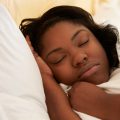Insomnia is defined as repeated difficulty with sleep initiation, maintenance, consolidation, or quality that occurs despite adequate time and opportunity for sleep, and that results in some form of daytime impairment. As many as 95% of Americans have reported an episode of insomnia at some point during their lives. In Nigeria Insomnia is very prevalent especially among students and the elderly according to recent studies.
Insomnia can be temporary—or it can be long-term. But regardless of how long you have to deal with it for, it’s never fun. At some point or another, most of us will experience a short, unpleasant bout of insomnia. Often, it’s the result of stress or a change in routine (like a new work schedule or having a baby), or medications that mess with sleep like antidepressants, blood pressure meds, allergy meds, and corticosteroids. The good news is that usually, once you find a way to deal with the situation, your sleep pattern will get back to normal.
But other times, insomnia can become a long-term thing. Sometimes, that can happen as the result of a more serious health condition, like depression, anxiety, or sleep apnea. Other times, insomnia can stem from crappy sleep habits, like eating too many heavy snacks before bed, sleeping in an uncomfortable environment, or staying glued to your smartphone or tablet all night long.
Either way, missing out on sleep leaves you feeling exhausted, irritable, and generally unable to function during the day. And over time, it can put you at risk for health issues like obesity, high blood pressure, heart disease, and diabetes.
But no matter how long your insomnia lasts for, there’s usually a way to deal with the root of the problem and start sleeping better.
What are the types of Insomnia?
There are two types of insomnia: primary and secondary.
Primary insomnia: This means your sleep problems aren’t linked to any other health condition or problem.
Secondary insomnia: This means you have trouble sleeping because of a health condition (like asthma, depression, arthritis, cancer, or heartburn); pain; medication; or substance use (like alcohol).
What are the causes of insomnia?
Causes of primary insomnia include:
- Stress-related to big life events, like a job loss or change, the death of a loved one, divorce, or moving
- Things around you like noise, light, or temperature
- Changes to your sleep schedule like jet lag, a new shift at work, or bad habits you picked up when you had other sleep problems
Causes of secondary insomnia include:
- Mental health issues like depression and anxiety
- Medications for colds, allergies, depression, high blood pressure, and asthma
- Pain or discomfort at night
- Caffeine, tobacco, or alcohol use
- Hyperthyroidism and other endocrine problems
- Other sleep disorders, like sleep apnea or restless legs syndrome
What are the risk factors for insomnia?
Insomnia affects women more than men and older people more than younger ones. Young and middle-age African Americans also have a higher risk. Other risk factors include:
- Long-term illness
- Mental health issues
- Working night shifts or shifts that rotate
- Insomnia Symptoms
What are the Symptoms of insomnia?
Symptoms of insomnia include:
- Sleepiness during the day
- Fatigue
- Grumpiness
- Problems with concentration or memory
How is Insomnia Diagnosed?
Your doctor will do a physical exam and ask about your medical history and sleep history.They might tell you to keep a sleep diary for a week or two, keeping track of your sleep patterns and how you feel during the day. They may talk to your bed partner about how much and how well you’re sleeping. You might also have special tests at a sleep center.
How is Insomnia Treated?
Acute insomnia may not need treatment. If it’s hard for you to do everyday activities because you’re tired, your doctor may prescribe sleeping pills for a short time. Medicines that work quickly but briefly can help you avoid problems like drowsiness the next day.
Don’t use over-the-counter sleeping pills for insomnia. They might have side effects, and they tend to work less well over time.
For chronic insomnia, you’ll need treatment for the conditions or health problems that are keeping you awake. Your doctor might also suggest behavioral therapy. This can help you change the things you do that make insomnia worse and learn what you can do to promote sleep.
Insomnia Complications
Our bodies and brains need sleep so they can repair themselves. It’s also crucial for learning and keeping memories. If insomnia is keeping you awake, you could have:
- A higher risk of health problems like high blood pressure, obesity, and depression
- A higher risk of falling, if you’re an older woman
- Trouble focusing
- Anxiety
- Grumpiness
- Slow reaction time that can lead to a car crash
Insomnia Remedies
Making Time for Exercise: In case you missed the memo, being physically active is essential for sleeping well. Mounting evidence shows that people who exercise regularly tend to snooze better than their couch potato counterparts—especially when it comes to those with chronic insomnia.
Not convinced? Consider this. One study concluded that people who get 60 minutes of exercise five days per week have more normal REM sleep than non-exercisers. But you might not need to sweat it out for quite that long to reap the benefits. Other findings show that insomniacs who engage in thirty-minute spurts of exercise just three or four times a week sleep for nearly an hour longer than sedentary folks and wake up less frequently during the night.
And if you can swing it, working out in the morning might be even more beneficial, according to one recent study. Experts can’t say why, exactly, it could have something to do with morning exercise’s ability to help regulate the secretion hormones that help manage blood pressure, which may lead to better sleep.
Why is working out seemingly so beneficial? The mechanisms aren’t entirely known, but National Sleep Foundation experts say that it could have to do with exercise’s ability to promote feelings of relaxation and reduce feelings of stress, anxiety, and depression. Staying active might also help to keep your body’s natural sleep-wake cycle in sync—particularly if you do it outside (more on that below).
Still, the explanation might be even simpler: Think about the days when you’re running around all day, or after you’ve wrapped up a really tough workout. Don’t you just feel more tired on those days compared to the ones where you just lay around all day and do nothing? Thought so.
Using Sunlight to Promote Healthy Melatonin Production: The sun might force you awake in the morning, but it’s also essential for helping you achieve restful sleep at night. That’s because your body relies on natural light to figure out what time it is, and determine whether to pump out energizing hormones or ones that leave you feeling relaxed and sleepy, like melatonin.
In other words, daylight helps your body’s natural clock—which is dictated by the 24-hour cycle of day and night—know when to feel awake and when to feel tired. “When our pineal gland is triggered by light, especially sunlight, it sends signals and releases wake-promoting hormones,” says Michele Roberge, RT(R), RPSGT, a neurodiagnostic lead technologist at Parrish Sleep Disorder Center. “A simple walk to the mailbox every morning could really benefit someone who is suffering from insomnia.”When your hypothalamus—the gland responsible for regulating sleep and energy levels—senses a change in light, it tells your body to ramp up or ramp down its production of the sleep hormone melatonin. During the day, you feel energized and alert because you don’t produce much melatonin. At night, you produce more, so you feel sleepy.
One way to keep everything on schedule is by flooding your body with light as soon as you get out of bed, which sends a clear message to your body that it’s time to wake up. Try opening your blinds, exercising outside, or even going sans sunglasses on your way to work.
And throughout the day, keep the natural light flowing. Sit near a window at work, or hang out outside during your lunch break. (Doing so could help you sleep for nearly an hour longer, suggests one recent study.) On the weekends, plan a picnic or take a hike instead of watching Netflix and chilling on the couch all afternoon.
Taking Steps to Manage Stress: feel tired or fatigued because of stress, according to a 2013 American Psychological Association poll Nearly 40% of Americans say that they often feel tired or fatigued because of stress.And it gets worse. When you’re wiped out during the day from not getting enough sleep, you tend to feel even more stressed, anxious, and irritable. Over time, the whole stress-sleep thing can turn into a vicious cycle. Which is why taking steps to manage your stress is so critical for achieving deeper, more restful sleep.. There are many effective ways to ease feelings of stress and promote feelings of relaxation. A few to try:
- You might think that writing stuff down would make you dwell on it. But when you focus on the things that you appreciate, you might actually sleep better. One recent study, published in Applied Psychology, found that students who wrote in a gratitude journal for just 15 minutes per night worried less at bedtime—and achieved better sleep.
- Guided imagery. Experts say that mind games like guided imagery can help you doze off faster. And it couldn’t be simpler: While you’re lying down, picture yourself in a relaxing, peaceful place. Over time the image becomes a sort of signal to your brain that it’s time to nod off.
- Progressive muscle relaxation.Because relaxing your physical body can be just as effective as relaxing your mind. Try repeatedly tensing and releasing your toes to the count of 10, and recommend experts at the University of Maryland Medical Center, Sleep Disorders Center. It’s crazy simple, but it can actually help relieve pent-up energy and help you feel more relaxed.
- Going to sleep early. It sounds counterintuitive, but trying to turn in earlier might make your worries sort of disappearing on their own. Compared to people who go to sleep early, those who stay up late are more likely to be overwhelmed by repetitive negative thoughts, found one study published late last year.
Eating Pro-Sleep Foods and Avoiding Sleep Stealers: It might seem surprising, but the things that you eat and drink could play a role in whether you drift off to sleep soundly or spend half the night tossing and turning. In fact, many edibles actually contain chemical properties that can make you feel relaxed or drowsy.
To help fight insomnia, consider adding some of these foods to your dinner menu or noshing on them for a nighttime snack.
- Cheese.Like your Thanksgiving turkey, cheese is rich in tryptophan. Tryptophan is an amino acid that’s needed to produce the neurotransmitter serotonin, which your body needs in order to feel relaxed and sleepy.
- The crunchy nuts, too, contain plenty of grog-inducing tryptophan. But that’s not all. Almonds are a good source of both calcium and magnesium, two minerals that experts say are important for achieving quality sleep.
- You’ll snooze better if your body has adequate levels of the omega-3 fatty acid DHA, found one British study published in the Journal of Sleep Research. Of course, other omega-3-rich fish like tuna, sardines, or mackerel can get the job done, too.
- Whole-grain crackers.It’s not just a coincidence that you immediately want to take a nap after chowing down on a carb-heavy meal. Carbs cause your body’s blood sugar levels to spike, which appears to play a role in regulating your body’s sleep-wake clock, suggests a recent Japanese study. Still, you’ll probably get a stomachache and end up tossing and turning all night—by devouring a gigantic bowl of pasta. So pick a lighter option, like a handful of whole-grain crackers.
- They’re the only edible source of the sleep hormone melatonin, so consider having a bowlful for dessert. If they’re not in season, opt for thawed frozen cherries or a glass of tart cherry juice. Drinking two glasses daily helped people with insomnia sleep for 90 more minutes, found one study published in the Journal of the Federation of American Societies for Experimental Biology.
- Low-fat milk. If uncomfortable heartburn keeps you up at night, try a glass of moo juice. The combo of high protein and low carbs can keep acid reflux at bay. Plus, it’s a good source of calcium, which helps keep your body’s melatonin production in check.
- Bananas.The yellow fruits have everything going for them. They’re rich in sleep-promoting carbohydrates and tryptophan, but that’s not all. Bananas also contain potassium and magnesium, which can help promote muscle relaxation.
But eating the right stuff isn’t the only way that food impacts your sleep, though. Steering clear of the wrong edibles and drinkables is equally important. A few to avoid in the name of getting a better night’s rest:
- Coffee and other caffeine-rich stuff.It might go without saying, but we’re going to say it anyway. Coffee can stay in your system for as long as six hours—which means that even a late afternoon cup could have an impact on your sleep. If you’re aiming to get to bed by 11, avoid coffee and other high-caffeine things like black tea, cola, and dark chocolate after 5 PM.
- Spicy foods.Can’t get enough sriracha? Save it for lunchtime. One International Journal of Psychophysiology study found that when people who consumed hot condiments (like Tabasco sauce or mustard) before bed took longer to fall asleep and achieved less restful sleep compared to when they skip the stuff. Researchers aren’t totally sure why spicy foods mess with your sleep, but it could be because they raise your body temperature.
- Fatty foods.People who eat high-fat fare tend to be more sleep-deprived compared to those who eat less of the stuff, says the National Sleep Foundation. That could be because heavy, greasy food is harder on your digestive system, and is more likely to cause sleep-stealing stomach discomfort.
Make Sleep-Friendly Lifestyle Changes
You’re exercising, getting plenty of exposure to natural light, and are eating better. It all adds up to good stuff, sleep-wise, but there are other lifestyle changes you could be making to snooze more soundly. A few to consider:
- Powering down in the evening.The blue light emitted from your smartphone, tablet, or computer is sort of like an electronic version of caffeine: It leaves your brain feeling revved up, rather than relaxed and ready for sleep. Make it a point to turn off your devices at least an hour before turning in.
- Showering at night instead of in the morning.The heat from a warm, pre-bedtime shower sends the message to your nervous system that it’s time to relax and slow down, encouraging you to feel sleepy. Which seems way more useful at night than first thing when you wake up, right?
- Sniffing lavender before bed.You might not think so, but scent can have a powerful effect on your mood. Consider taking advantage of aromatherapy to fill your bedroom with aromas that are thought to ease anxiety and promote relaxation, like lavender, spikenard, vetiver, frankincense, myrrh, and clary sage.
Finally, don’t discount the powerful effect of a super comfortable bedroom. If you’ve ever spent a night tossing and turning because of a too-hot room or wonky mattress, you know that feeling uncomfortable can make it almost impossible to fall—and stay—asleep.
Insomnia Prevention tips
Good sleep habits, also called sleep hygiene, can help you beat insomnia. Here are some tips:
- Go to sleep at the same time each night, and get up at the same time each morning. Try not to take naps during the day, because they may make you less sleepy at night.
- Don’t use phones or e-books before bed. Their light can make it harder to fall asleep.
- Avoid caffeine, nicotine, and alcohol late in the day. Caffeine and nicotine are stimulants and can keep you from falling asleep. Alcohol can make you wake up in the middle of the night and hurt your sleep quality.
- Get regular exercise. Try not to work out close to bedtime, because it may make it hard to fall asleep. Experts suggest exercising at least 3 to 4 hours before bed.
- Don’t eat a heavy meal late in the day. But a light snack before bedtime may help you sleep.
- Make your bedroom comfortable: dark, quiet, and not too warm or too cold. If the light is a problem, use a sleeping mask. To cover up sounds, try earplugs, a fan, or a white noise machine.
- Follow a routine to relax before bed. Read a book, listen to music, or take a bath.
- Don’t use your bed for anything other than sleep and sex.
- If you can’t fall asleep and aren’t drowsy, get up and do something calming, like reading until you feel sleepy.
- If you tend to lie awake and worry about things, make a to-do list before you go to bed. This may help you put your concerns aside for the night.




![How To Cure A Sore [Strep] Throat Fast](https://www.publichealth.com.ng/wp-content/uploads/2018/07/How-To-Cure-A-Sore-Strep-Throat-Fast-120x120.jpg)

